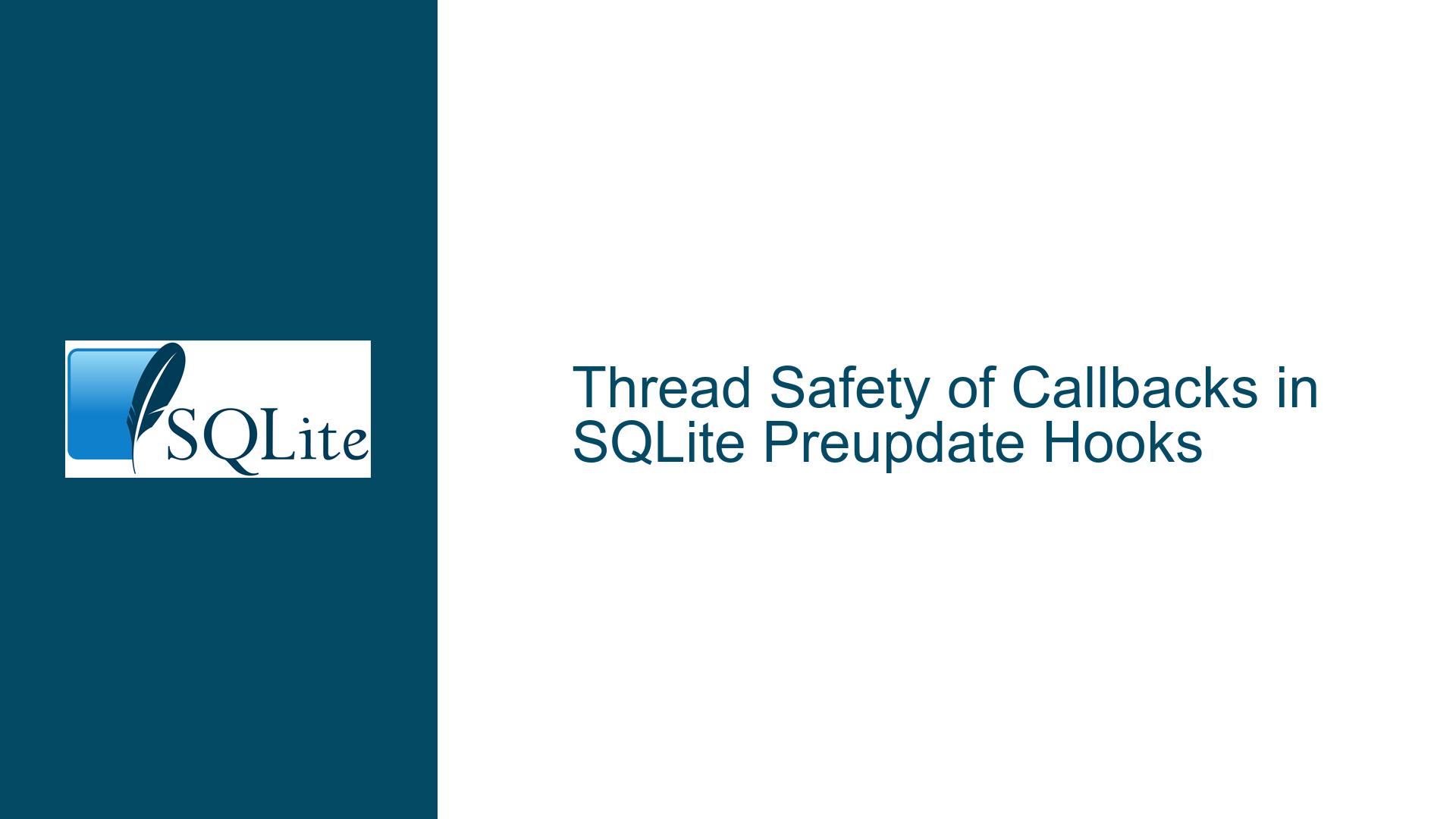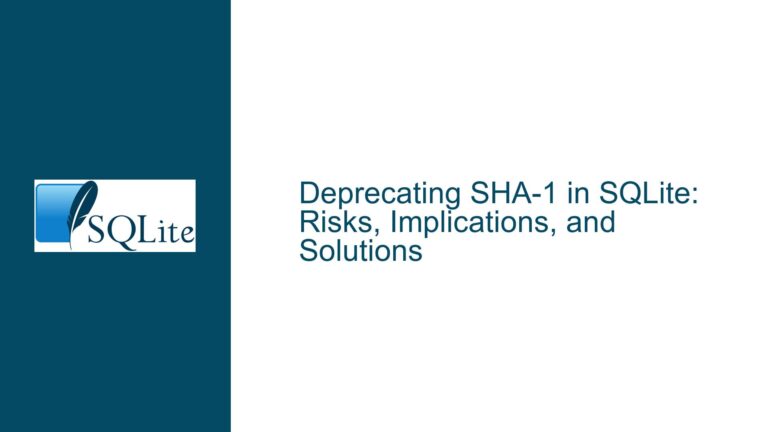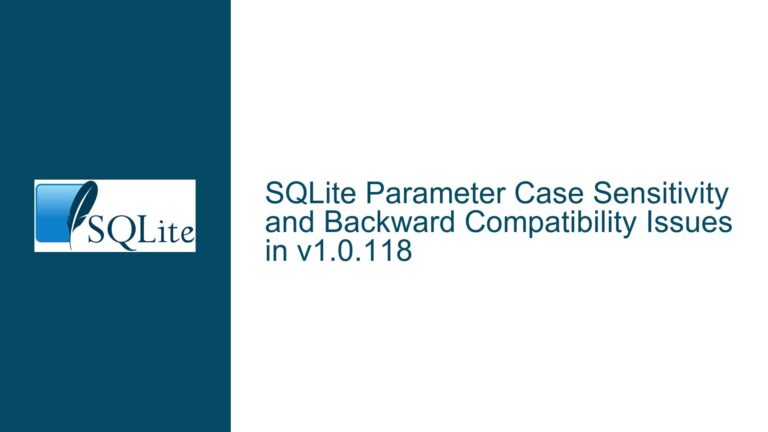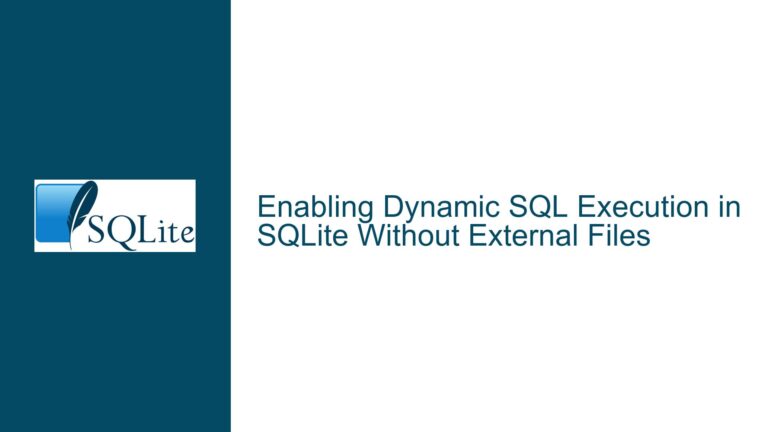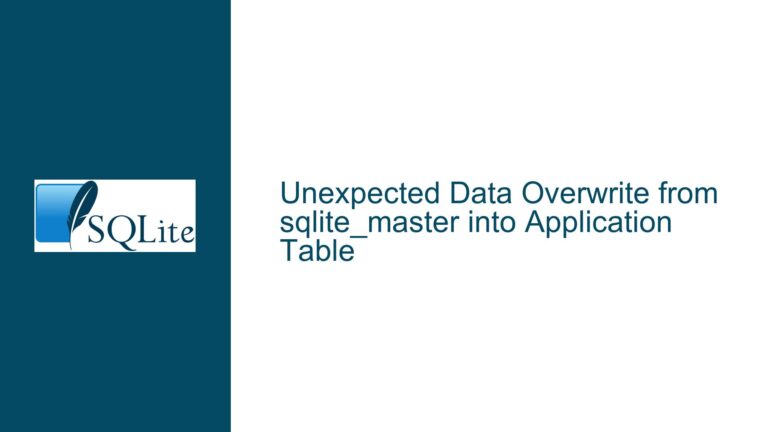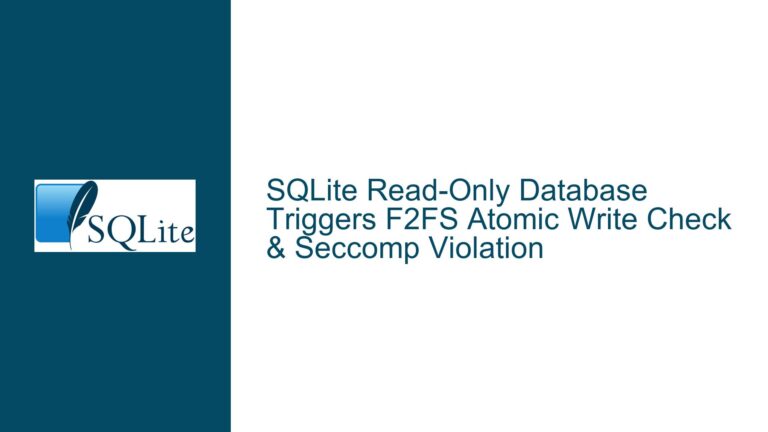Thread Safety of Callbacks in SQLite Preupdate Hooks
Understanding the Thread Safety of xPreUpdate Callbacks in sqlite3_preupdate_hook
The sqlite3_preupdate_hook function in SQLite allows developers to register a callback function (xPreUpdate) that is invoked immediately before a row is updated, inserted, or deleted in the database. This callback can be used to inspect or modify the data before the change is committed. However, a critical question arises when dealing with multi-threaded applications: Is the xPreUpdate callback required to be thread-safe? This question is particularly relevant when multiple threads are executing write operations (INSERT, UPDATE, DELETE) on the same database connection or handle.
The thread safety of the xPreUpdate callback depends on several factors, including how SQLite manages database connections, locks, and the execution context of the callback. SQLite is designed to handle multiple threads accessing the same database, but the behavior of user-defined callbacks like xPreUpdate is not explicitly documented in terms of thread safety. This lack of clarity can lead to confusion and potential issues in multi-threaded environments.
To fully understand the thread safety of the xPreUpdate callback, we must first examine the execution context of the callback. When a thread calls sqlite3_step() to execute a write operation, SQLite acquires the necessary locks to ensure that only one thread can modify the database at a time. The xPreUpdate callback is invoked during this process, but the exact locking behavior during the callback execution is not explicitly stated in the documentation.
In a single-threaded application, the thread safety of the xPreUpdate callback is not a concern because only one thread is accessing the database. However, in a multi-threaded application, multiple threads may attempt to execute write operations simultaneously. If the xPreUpdate callback accesses shared resources (such as the pCtx argument or other global variables), it must be thread-safe to avoid race conditions and undefined behavior.
The pCtx argument passed to the xPreUpdate callback is a user-defined pointer that can be used to pass additional context or data to the callback. If multiple threads are executing write operations and the xPreUpdate callback accesses or modifies the pCtx argument, the application must ensure that access to pCtx is synchronized. This can be achieved using mutexes, semaphores, or other thread synchronization mechanisms.
Furthermore, the thread safety of the xPreUpdate callback also depends on the build and runtime options of the SQLite library. By default, SQLite is compiled with thread safety enabled, which means that the library uses internal locks to protect against concurrent access to the database connection. However, if SQLite is compiled with thread safety disabled, the application must ensure that only one thread accesses the database connection at a time. In this case, the xPreUpdate callback does not need to be thread-safe because the application is responsible for enforcing single-threaded access.
In summary, the thread safety of the xPreUpdate callback in sqlite3_preupdate_hook depends on the following factors:
- Whether the application is single-threaded or multi-threaded.
- Whether the callback accesses shared resources, such as the
pCtxargument or global variables. - Whether SQLite is compiled with thread safety enabled or disabled.
Exploring the Execution Context and Locking Behavior of xPreUpdate Callbacks
To determine whether the xPreUpdate callback is called with the write lock held, we must examine the internal locking mechanism of SQLite. SQLite uses a combination of file locks and internal mutexes to ensure that only one thread can modify the database at a time. When a thread calls sqlite3_step() to execute a write operation, SQLite acquires the necessary locks to prevent other threads from modifying the database.
The xPreUpdate callback is invoked during the execution of sqlite3_step(), which means that the callback is called while the write lock is held. This ensures that the callback has exclusive access to the database during its execution. However, the callback is not protected by SQLite’s internal locks if it accesses shared resources outside the database, such as the pCtx argument or global variables.
If the xPreUpdate callback modifies the pCtx argument or other shared resources, the application must ensure that access to these resources is synchronized. For example, if multiple threads are executing write operations and the xPreUpdate callback modifies a global variable, the application must use a mutex to protect access to the global variable. Failure to do so can result in race conditions and undefined behavior.
In addition to the locking behavior, the execution context of the xPreUpdate callback also depends on the re-entrance protection provided by SQLite. Re-entrance protection ensures that the SQLite library can be safely used by multiple threads without causing deadlocks or other synchronization issues. The xPreUpdate callback is called under the same re-entrance protection as the rest of the SQLite library, which means that the callback is executed in a thread-safe manner as long as the application does not introduce additional synchronization issues.
However, the re-entrance protection provided by SQLite is not foolproof. If the xPreUpdate callback calls other SQLite functions that acquire locks or modify the database, the application must ensure that these calls do not cause deadlocks or other synchronization issues. For example, if the xPreUpdate callback calls sqlite3_exec() to execute another SQL statement, the application must ensure that the call does not interfere with the ongoing write operation.
In summary, the xPreUpdate callback is called with the write lock held, which ensures that the callback has exclusive access to the database during its execution. However, the callback is not protected by SQLite’s internal locks if it accesses shared resources outside the database. The application must ensure that access to these resources is synchronized to avoid race conditions and undefined behavior.
Best Practices for Ensuring Thread Safety in xPreUpdate Callbacks
To ensure thread safety in the xPreUpdate callback, developers should follow these best practices:
Avoid Accessing Shared Resources: If possible, the
xPreUpdatecallback should avoid accessing shared resources, such as thepCtxargument or global variables. Instead, the callback should only access local variables or data that is specific to the current execution context.Use Thread Synchronization Mechanisms: If the
xPreUpdatecallback must access shared resources, the application should use thread synchronization mechanisms, such as mutexes or semaphores, to protect access to these resources. For example, if the callback modifies a global variable, the application should use a mutex to ensure that only one thread can modify the variable at a time.Ensure Re-entrance Safety: If the
xPreUpdatecallback calls other SQLite functions, the application should ensure that these calls do not cause deadlocks or other synchronization issues. For example, if the callback callssqlite3_exec()to execute another SQL statement, the application should ensure that the call does not interfere with the ongoing write operation.Compile SQLite with Thread Safety Enabled: To ensure that the SQLite library provides the necessary thread safety guarantees, the application should compile SQLite with thread safety enabled. This ensures that the library uses internal locks to protect against concurrent access to the database connection.
Test in Multi-threaded Environments: Before deploying the application, developers should thoroughly test the
xPreUpdatecallback in multi-threaded environments to ensure that it behaves correctly under concurrent access. This includes testing with different numbers of threads, different types of write operations, and different levels of contention.
By following these best practices, developers can ensure that the xPreUpdate callback is thread-safe and behaves correctly in multi-threaded environments. This will help prevent race conditions, deadlocks, and other synchronization issues that can arise when multiple threads access the same database connection.
In conclusion, the thread safety of the xPreUpdate callback in sqlite3_preupdate_hook depends on several factors, including the execution context, locking behavior, and access to shared resources. Developers must carefully consider these factors and follow best practices to ensure that the callback is thread-safe and behaves correctly in multi-threaded environments. By doing so, they can avoid potential issues and ensure the reliability and performance of their SQLite-based applications.
